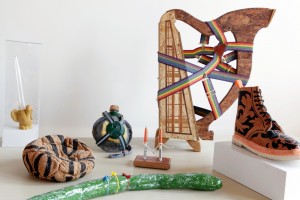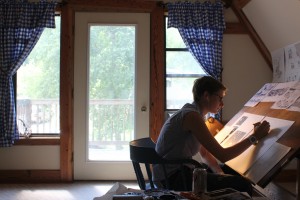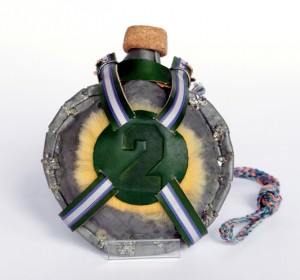Echo Scholarship Auction – Betsy Odom
BETSY ODOM
– Echo Scholarship Auction –
Click to go to auction
Canteen, 2011
lead, leather, wool, cork, fabric, wax
12″ x 11″ x 8″
Estimated Value: $1500
Betsy’s scholarship is intended to support a female artist who has been out of school for at least 2 years.
..
“Materials have meaning”
 Material and culture are at the heart of Betsy Odom’s art. During our interview, she reflected on the realization that perhaps they always have been. As a child Betsy loved to draw; this passion was shared with her two brothers. During high school Betsy got the opportunity to immerse herself in art. It was during this period of her early life that she created what she considers to be one of her first pieces of art. Playing on her rural roots she crafted three stacked tractors out of foam. Atop the tractors was a small patch of live, growing sprouts. Even in this early piece she foreshadowed her current practice, with a careful consideration of materials and a reflective focus on identity and culture. Even then, she said, her goal was to “try to cut the surface of the material and let out the meaning.” By the end of high school she knew that fine art was her future.
Material and culture are at the heart of Betsy Odom’s art. During our interview, she reflected on the realization that perhaps they always have been. As a child Betsy loved to draw; this passion was shared with her two brothers. During high school Betsy got the opportunity to immerse herself in art. It was during this period of her early life that she created what she considers to be one of her first pieces of art. Playing on her rural roots she crafted three stacked tractors out of foam. Atop the tractors was a small patch of live, growing sprouts. Even in this early piece she foreshadowed her current practice, with a careful consideration of materials and a reflective focus on identity and culture. Even then, she said, her goal was to “try to cut the surface of the material and let out the meaning.” By the end of high school she knew that fine art was her future.
 Betsy contemplates both the physical and the transcendent qualities of her work, from the origins of each material to the references it makes to American sub-cultures. Every material she uses is careful selected, sought, and treated with an eye toward the stories it tells and its own intrinsic qualities. She seeks materials that are unique and alien, strange in their weight, appearance, or texture. Her curiosity over how materials factor into the meaning of a piece is apparent in the Canteen. Although it clearly references a metal camp canteen, it is made of lead, making it heavy and poisonous, the very opposite of a real canteen. Canteen also illustrates Betsy’s keen interest in how art speaks to identity and culture. In this piece she points to the sub-culture of camping, as well as the cultural practice of summer camps. To her, summer camps represent a dissonant, formative experience that is at once trying and confidence building. In other pieces she explores queer culture and women’s sports. In her work she examines the nature of subcultures and how they come to be. Although this is serious work, she often injects a measure of absurdity or whimsy into her art, creating objects that in some senses “defeat themselves.”
Betsy contemplates both the physical and the transcendent qualities of her work, from the origins of each material to the references it makes to American sub-cultures. Every material she uses is careful selected, sought, and treated with an eye toward the stories it tells and its own intrinsic qualities. She seeks materials that are unique and alien, strange in their weight, appearance, or texture. Her curiosity over how materials factor into the meaning of a piece is apparent in the Canteen. Although it clearly references a metal camp canteen, it is made of lead, making it heavy and poisonous, the very opposite of a real canteen. Canteen also illustrates Betsy’s keen interest in how art speaks to identity and culture. In this piece she points to the sub-culture of camping, as well as the cultural practice of summer camps. To her, summer camps represent a dissonant, formative experience that is at once trying and confidence building. In other pieces she explores queer culture and women’s sports. In her work she examines the nature of subcultures and how they come to be. Although this is serious work, she often injects a measure of absurdity or whimsy into her art, creating objects that in some senses “defeat themselves.”
 ACRE came into Betsy’s life by way of a student involved in the organization. Based on his recommendation, she felt it was the perfect place for her to examine her practice. In her words, “ACRE gave me a place to get outside of my practice and for that to feel like my practice.” ACRE was a place she could explore her work and break down the barriers between her art and her hobbies. She remembers playing banjo in a silo and having other residents respect and understand this experience. ACRE seemed to open doors in her work that were shut during her daily grind, enabling her to explore new forms of expression. For her products were not the focus of her residency; rather, the residency was an opportunity for her to focus on the private performative nature of creating her art. The friendships she fostered during this experience have been deep and enduring. There is a bond she feels ACRE residents share. It is a group of people who take their work and each other very seriously; this creates an environment of trust and respect. One of her fondest memories is walking across the meadow in the early hours of the morning as the fog rolled in. Other residents walked between studios happily burning the midnight oil to see each other’s work. She said that it was also most like a field of “free range artists” wandering around on this “weird nature preserve.”
ACRE came into Betsy’s life by way of a student involved in the organization. Based on his recommendation, she felt it was the perfect place for her to examine her practice. In her words, “ACRE gave me a place to get outside of my practice and for that to feel like my practice.” ACRE was a place she could explore her work and break down the barriers between her art and her hobbies. She remembers playing banjo in a silo and having other residents respect and understand this experience. ACRE seemed to open doors in her work that were shut during her daily grind, enabling her to explore new forms of expression. For her products were not the focus of her residency; rather, the residency was an opportunity for her to focus on the private performative nature of creating her art. The friendships she fostered during this experience have been deep and enduring. There is a bond she feels ACRE residents share. It is a group of people who take their work and each other very seriously; this creates an environment of trust and respect. One of her fondest memories is walking across the meadow in the early hours of the morning as the fog rolled in. Other residents walked between studios happily burning the midnight oil to see each other’s work. She said that it was also most like a field of “free range artists” wandering around on this “weird nature preserve.”
Betsy feels that ACRE is unique among art organizations. For her, it represents a place where the definition of work can change, becoming something introspective and collective. You don’t need to come home with lots of pieces, she says. Rather, artists should take time at the residency to liberate their work and explore new directions. “You should come home exhausted and ready to go back.” In essence, she says, ACRE is progressive, earnest and a little wild.
Ashlan Falletta-Cowden
